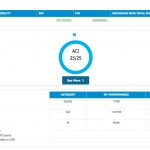“It’s very important for our community of physicians to make sure they are staying on top of this,” she said. The CMS made the positive payment threshold easy to attain in the first year. Participants will have to report only on a single quality measure to avoid a 4% negative adjustment. “Think of a treadmill. It will only move faster and faster. So get on at the beginning when the penalties are smaller, and be well positioned to get better incentive payments as we move along.”
The ACR will focus on building more quality measures included in the Clinical Practice Improvement Activities domain of MIPS into RISE to make reporting easier and more meaningful for members, said Dr. Yazdany.
In the first year, participants in MIPS will have to report only on a single measure to avoid a negative adjustment.
“MIPS will get less lenient as time goes on, but just by participating in some way, rheumatologists should be OK. No rheumatologist should face a penalty if they report even a single measure in 2017,” she said. “What’s nice about using RISE is that it includes specific measures that are relevant to rheumatology practices and the registry will adapt to streamline and simplify quality reporting over time.”
By using RISE, a practice can also review and compare their current quality scores on a data dashboard: green indicates a user is above the registry mean, yellow indicates at the mean, and red warns a practice is below the mean. All analytics are provided as a benefit of using RISE.
Relevant Measures
Catalina Orozco, MD, a rheumatologist in Dallas, and Brian Loggins, PA, a rheumatology practice manager in San Antonio, offered the following information and tips:
- Involve a clinician in initial set-up. RISE offers technology consultants to connect practices to the registry, but a clinician will help tailor the interface to your practice’s workflow and ensure more accurate data mapping.
- Track specific measures. The ACR’s quality subcommittee is working on developing quality measures in RISE that are relevant to rheumatology practices. Currently, measures for RA, gout and glucocorticoid-induced osteoporosis are incorporated into RISE.
- Record patient encounter information in structured data fields. This will help RISE track your quality measures more effectively, said Dr. Orozco. Users can also resubmit data if RISE does not capture or transfer it properly.
Note: Cloud-based issues are being fixed. Rheumatology practices that used cloud-based EHRs had problems using RISE in the past, but the Registry has updated technology that is tackling this problem, Dr. Yazdany said.


